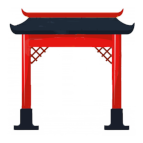|
|
分
|
 |
|
JLPT HSK 1 |
|
| to divide, to separate, to distinguish, part, fraction
|
Top: eight 八, bottom: sword 刀
Into eight parts the swords divides by separating.

|
|
|
|
小
|
 |
|
JLPT HSK 1 |
|
| small, tiny, few, young
|
A person 亅 with the arms 八 close to the body appears: small.

|
|
|
|
八
|
 |
|
JLPT HSK 1 |
|
| eight, 8
|
Two hands with the four fingers each (without thumb) which maks a total of eight.

|
|
|
|
六
|
 |
|
JLPT HSK 1 |
|
| six, 6
|
One 丶 plus two 八 makes three. When this is cut 一 you get six parts.

|
|
|
|
公
|
 |
|
JLPT HSK 2 |
|
| public, collectively owned, common, male (animal)
|
Eight 八, nose 厶 (a nose in side view)
Eight noses stand for the public.

|
|
|
|
只
|
 |
|
JLPT HSK 3 |
|
| just one of a several, unique, merely, only
|
Image of a person consisting only of a mouth 口 and two legs 八
This person has a huge mouth, which is only one and unique.

|
|
|
|
具
|
 |
|
JLPT HSK 4 |
|
| tool, device, equipment, instrument, to possess
|
An eye 目 and a table 
The eye sees on the table: a tool.

|
|
|
|
兵
|
 |
|
JLPT HSK 5 |
|
| soldiers, an army, military
|
Top: hill 丘 (An axe 斤 in the ground 一 as a burial object in the [burial] mound/hill.), below: eight 八
At the hill are eight soldiers.

|
|
|
|
兽
|
 |
|
JLPT HSK 6 |
|
| beast, animal, bestial, ferocious
shòu
八
 |
|
From top: out 丷 (here: widely), rice field 田, one 一 mouth 口
Widely open like a rice field is one mouth of the beast.

|
|
|
|
叭
|
 |
|
JLPT HSK 6 |
|
| sound of trumpet, horn or sharp noise (gunfire etc)
|
Left: mouth 口, right: Bell 八 of the trumpet
From a "mouth" that widens [towards the lower end] like an eight 八 comes the "sound of a trumpet".

|
|
|
|
趴
|
 |
|
JLPT HSK 6 |
|
| to lie on one's stomach, to lean forward
|
Left: foot 足 (knee cap 口 and footprint 止), right: eight 八 (here: two legs)
When the feet are aside to the legs, you are lying on the stomach.

|
|
|
|
睦
|
 |
|
JLPT HSK 6 |
|
| friendly, harmonious, amicable, peaceful relations
|
Left: eye 目, right: 坴 (eight 八, 2 x land 土)
The view on all that land is friendly and harmonious.

|
|
|
|
扒
|
 |
|
JLPT HSK 6 |
|
| to cling to, hold on to, push aside, strip off, rake up
|
Left: hand 扌, right: eight 八, (here variant of: grab/catch 抓 [The hand 扌 as a claw 爪 for: grabbing or arresting]
The hand is claw-like for: clinging or holding.

|
|
|
|
兮
|
 |
|
JLPT no HSK |
|
| (exclamation particle in old Chinese)
|
"Eight 八 seaweeds 丂" as exclamation

|
|
|
|
冀
|
 |
|
JLPT no HSK |
|
| to hope, wish, (abbr. for Hebei 河北)
|
Top: north 北 (2 people sit back-to-back because it is cold in: the north.), bottom: differ, extraordinary 異 (Put a rice paddy 田 together 共 (with other paddies) and you will see how much they differ.)
(Everyone joins the work) Also on the northern fields we shall work together! That's what I hope for!

|
|
|
|
逵
|
 |
|
JLPT no HSK |
|
| crossroads, thoroughfare
|
Left: movement 辶, right: 坴 (2x earth 土, in the middle: two ways 八)
For the movement on two ways between twice 'earths' [hills?], there is: a crossing.

|
|

